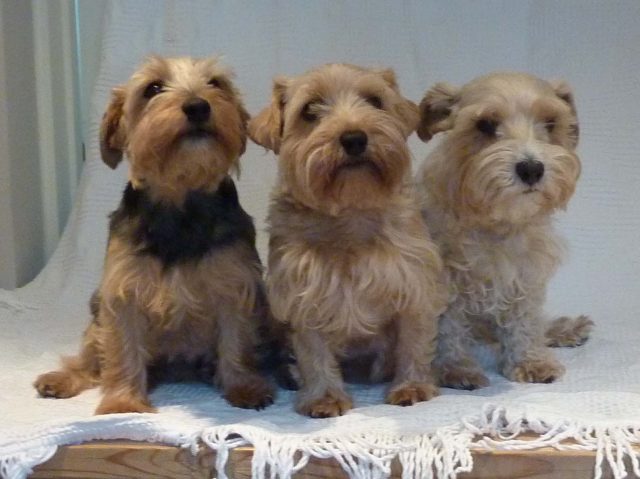Type the name of the breed you're looking for below
[wpdreams_ajaxsearchlite] Don't see the breed your're looking for? Click here and let us know!
Breed Characteristics
1 paw - breed exhibits the least amount of this characteristic
5 paws - breed exhibits most amount of this characteristic
Lucas Terrier
| Other Names | Sporting Lucas Terrier |
| Country of Origin | Great Britain |
| Weight | Males: 14 - 20 lbs. (6 - 9 kg) Females: 11 - 17 lbs. (5 - 8 kg) |
| Height (at withers) | Males: 10 - 12 in. (25 - 30 cm) Females: 9 - 11 in. (23 - 28 cm) |
| Coat | The coat should be fairly harsh, weather resistant and of medium length. |
| Colour | It may be coloured or white, but the majority are tan, black and tan or saddle and tan. |
| Litter Size | 3 - 6 puppies |
| Life Span | 14 - 16 years |
| Origin & History | Sir Jocelyn Lucas, 4th Baronet, a long-time Sealyham breeder in the first half of the 20th Century, bred the first cross between a Norfolk Terrier and one of his own Ilmer Sealyhams. Ilmer Sealyhams were smaller than the mainstream show Sealyhams of the time. He found the mix produced an intelligent and feisty dog with an excellent temperament, suitable for use as a working terrier but equally happy as a domestic pet, and so named the cross after himself. Several distinct lines of Lucas Terrier were bred from the late 1940s, and these are still unbroken today. In later years his extensive kennels were managed by the Hon Mrs Enid Plummer, and she ran the breeding programme for him as he became older and less involved. Sir Jocelyn died in 1980. Just prior to that, in the late 1970s, Enid Plummer moved to Cornwall with some remaining Lucas Terriers and continued breeding there until she died in 1986. Miss Jumbo Frost took on the task of growing the breed from Enid Plummer, who she knew well, and her dedication, foresight and personal generosity carried Lucas Terriers through until she too died in 2009. During that time she oversaw a transformation in the fortunes of the breed, formalised the breeding by establishing the Lucas Terrier Club, was instrumental in widening the gene pool and in setting a number of standards which are still followed today. |
| Personality | The Lucas Terrier is a small, sweet, non-exaggerated British terrier that is making a comeback in popularity in the U.S. Smart and easy to train. Friendly toward people and other dogs. Excellent with children. Eagar to please. Not a yapper by nature. Likes to dig. Make sure you are this dog's firm, confident, consistent pack leader to avoid Small Dog Syndrome, human induced behavior problems. Always remember, dogs are canines, not humans. Be sure to meet their natural instincts as animals. |
Care Requirements
| Health | There are no known breed-specific health concerns. |
| Grooming | Brush weekly, bathe occasionally when necessary. Hand stripping is the preferred method of grooming this breed's double coat. They shed little to no hair and have low doggie odor. |
| Exercise | This breed needs a daily walk. Play will take care of a lot of their exercise needs, however, as with all breeds, play will not fulfill their primal instinct to walk. Dogs that do not get to go on daily walks are more likely to display behavior problems. They will also enjoy a good romp in a safe, open area off lead, such as a large, fenced-in yard. The breed is a low-energy dog that makes a good walking companion. Calm and content indoors, adaptable to life in town or the country. |
| Other Considerations | Good for apartment living. They are relatively inactive indoors and will do okay without a yard. |



